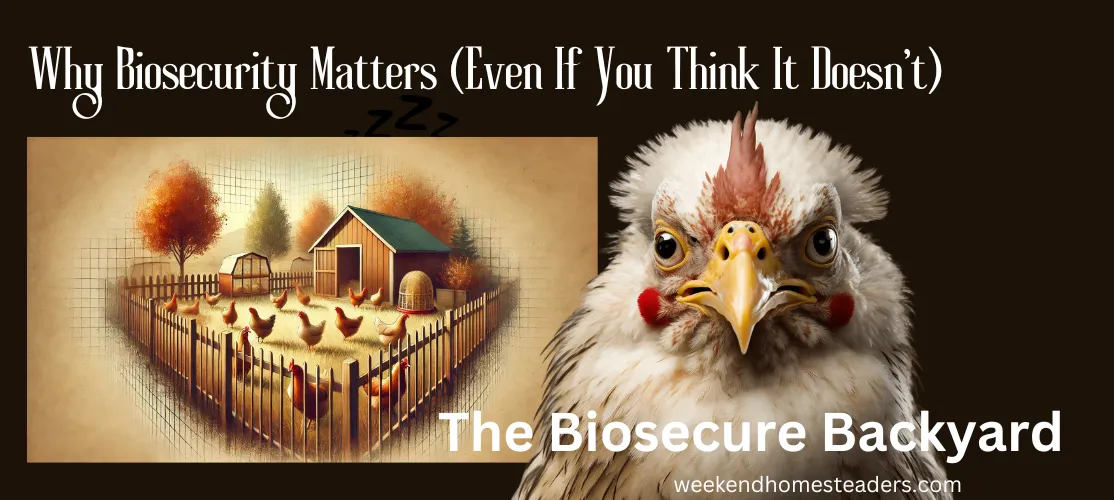
Why Biosecurity Matters (Even If You Think It Doesn't)
Biosecurity. It's a word that gets tossed around a lot, especially when it comes to backyard flocks. For some, it feels like an annoying checklist of do’s and don’ts. For others, it sounds like a government conspiracy to scare small-scale chicken keepers and raise prices. Let’s face it—biosecurity can feel like a hassle, and it’s easy to dismiss it as unnecessary or even a scam. But is it really?
Let’s break it down. Here’s why biosecurity deserves your attention, even if you’re skeptical about the motives behind it.
Why Biosecurity Feels Like Overkill
First off, if you’ve ever thought, “I’ve been keeping chickens for years without following any fancy biosecurity rules, and they’re fine,” you’re not alone. A lot of flock owners feel this way. After all, it’s hard to take something seriously when you haven’t personally experienced the consequences.
Or maybe you’ve heard that avian influenza (AI) is just a ploy to raise prices on commercial poultry and eggs. With so much misinformation floating around, it’s easy to write off biosecurity as “big farm propaganda” or another way to control small backyard flocks.
Here’s the truth: Diseases like avian influenza aren’t just “big farm” problems—they can affect any flock, no matter the size. In fact, small backyard flocks can be even more vulnerable because they’re often less controlled and more exposed to wild birds and other disease carriers.
So, Is AI a Scam or a Real Threat?
Let’s talk about avian influenza (AI), one of the most talked-about poultry diseases. Yes, AI is real. It’s not just a commercial farm problem or a government ploy—it’s a global issue. AI outbreaks have caused devastation to backyard flocks, small farms, and even wild bird populations. And here’s the kicker: AI doesn’t discriminate.
If a single infected wild bird visits your property or contaminates your flock’s water source, it can wipe out your entire flock in days. Yes, even if you’re not a commercial farmer.
And while you might not think your backyard chickens are part of a bigger picture, they are. Backyard flocks can inadvertently spread diseases to other birds in the area, contributing to regional or national outbreaks. It’s not a scam—it’s science.
Why Many Flock Owners Don’t Take Biosecurity Seriously
Let’s address the elephant in the room: Biosecurity can seem like overkill.
For the average backyard chicken keeper, the idea of wearing dedicated shoes, avoiding visits to other farms, or keeping visitors away from the coop can feel... extreme. After all, it’s just a couple of chickens in your yard—why all the fuss?
Here are some common reasons people dismiss biosecurity:
“It’s too much effort.”
Cleaning tools, using shoe covers, and keeping records? Who has time for that?
“It’s not going to happen to me.”
If your flock has never been sick, it’s easy to think disease outbreaks are someone else’s problem.
“It’s just a scare tactic.”
Some believe biosecurity is exaggerated to benefit big industries or push government agendas.
The reality is that disease outbreaks don’t care about your skepticism. Biosecurity isn’t about making your life harder—it’s about protecting your birds, your investment, and yes, your community.
What Biosecurity Really Is (And Isn’t)
Let’s demystify biosecurity for a second. At its core, biosecurity is just a fancy word for common sense practices that keep your flock safe from disease. It’s not about being paranoid or jumping through unnecessary hoops—it’s about prevention.
Here’s what biosecurity doesn’t mean:
It’s NOT about controlling backyard flocks.
It’s NOT just for large-scale commercial farms.
It’s NOT a government conspiracy.
Here’s what it does mean:
Keeping your birds safe from preventable diseases like avian influenza, Newcastle disease, and salmonella.
Stopping the spread of illness to other flocks, both backyard and commercial.
Protecting your time, money, and emotional investment in your birds.
The Cost of Ignoring Biosecurity
You might think, “What’s the worst that could happen?” Unfortunately, the worst can be devastating:
Your flock wiped out overnight: Diseases like AI or Newcastle disease can spread rapidly and leave you with no survivors.
Quarantine measures in your area: In the event of a local outbreak, even backyard flocks can face testing, quarantine, or culling.
Emotional toll: Losing birds you’ve raised from chicks isn’t just frustrating—it’s heartbreaking.
And the cost of ignoring biosecurity goes beyond your own backyard. Diseases spread by poorly managed flocks can lead to regional outbreaks, higher egg and poultry prices, and stricter regulations for all poultry keepers.
Biosecurity Doesn't Have to Be Hard
The good news? Biosecurity doesn’t have to be overwhelming or expensive. You can start small with simple steps that make a big difference:
Dedicated Shoes or Shoe Covers: Don’t track germs into your coop. Keep a pair of boots just for chicken chores or use disposable covers.
Limit Visitors: Don’t let people who’ve been around other birds enter your coop or run.
Clean Your Equipment: Wash feeders, waterers, and tools regularly to prevent bacteria buildup.
Keep Wild Birds Away: Use netting or fencing to stop wild birds from accessing your flock’s food and water.
Quarantine New Birds: Isolate new chickens for at least two weeks to ensure they’re healthy before introducing them to your flock.
These small steps can significantly reduce your flock’s exposure to harmful pathogens without disrupting your routine.
The Bottom Line
You love your chickens—they’re not just livestock; they’re part of your family. Biosecurity isn’t a scam, a government ploy, or unnecessary busywork. It’s a way to protect the birds you care about and ensure they live healthy, happy lives.
So next time someone says, “Biosecurity doesn’t matter,” remember this: Diseases like AI don’t care if you believe in them or not. But with a little effort, you can protect your flock and keep your chickens safe. Isn’t that worth it?
Have questions about biosecurity?Let us know! Let’s keep the conversation going. 🐔
